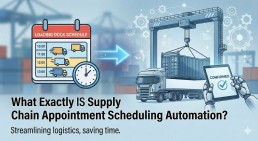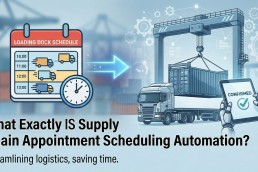The Hidden Cost of Manual Scheduling in Trucking
How Outdating Scheduling Drains Profits

The Impact on Profits
In transportation and logistics, every minute and mile impacts profitability. Yet, many transportation companies still need to rely on manual scheduling, slows them down and drains profits. From delayed shipments and missed appointments to costly errors, manual scheduling increases operating costs and risks customer satisfaction—ultimately reducing revenue.
Rising Operational Costs
Scheduling has become one of the most resource-intensive tasks for carriers. Securing a single appointment often requires juggling between multiple systems, with 60% of bookings handled via email, 30% through online portals, and 10% by phone. Additionally, 30% of appointments are rescheduled, increasing workloads and inefficiency. This dependency on “tribal knowledge” adds inconsistency and raises costs.
Penalties for Late Deliveries
Missed deliveries often lead to fines, especially from retailers with strict performance standards. These penalties add up quickly, turning profitable deliveries into costly ones and straining carrier margins.
Missed Revenue Opportunities
Idle trucks and underutilized capacity due to inefficient scheduling reduce revenue potential. Optimized scheduling can increase revenue per mile, but manual processes often fall short.
Impact on Customer Satisfaction
Reliable, transparent delivery schedules are crucial for customer loyalty. Manual scheduling lacks real-time coordination, often leaving customers uninformed about delays, which can erode trust and retention.
Increased Error Risks
Manual processes are prone to costly errors—from duplicate bookings to missed cancellations—that can disrupt operations and lead to wasted resources.
Take Control Of your Scheduling Costs
With the soft freight market, every dollar counts. Implementing scheduling automation with the right partner, like BiggerPicture, is not only easy but essential. It helps reduce costs, improve efficiency, and enhance customer satisfaction. For trucking companies looking to protect their bottom line and gain a competitive edge, scheduling automation is the smart investment for a more resilient future.




